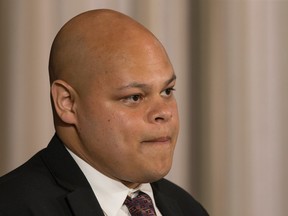After this week’s byelection victory, the Conservative leader looks to be headed for a huge majority in the next federal election. How will he spend all that political capital?

Article content
In terms of writing on the wall, this week’s federal byelection result in Ontario was delivered in ALL CAPS and in blood-red font. It’s curtains for Justin Trudeau and his Liberal government.
Conservative Jamil Jivani took the riding of Durham with 55.7 per cent of the vote, easily outpacing his Liberal rival, who tallied up a meagre 22.5 per cent. And while a single byelection — in a Tory-held seat, to be sure — is not necessarily prologue, no one in Liberal Party HQ should be expecting anything different come the next federal election. Pierre Poilievre’s victory is now a question of “by how much?” not “if.”
Advertisement 2
Article content
Article content
Everything the Liberals tried in order to boost their chances fell flat. Trudeau stooped to take a swing at Jivani, derisively labelling him a “twofer,” a remark that drew unhelpful comparisons to the more pleasant 2015 version of Trudeau, that now-distant figure touting “sunny ways.” The Liberals then re-upped their pharmacare pledge, tabling Bill C-64 in the House of Commons, i.e. the legislative follow-through on their previous vague promises of universal pharmacare.
And yet, Jivani still felled his opponent with ease. Let’s hope the national drug formulary includes smelling salts for soon-to-be-retired prime ministers.
Coming as it did soon after the death of former prime minister Brian Mulroney, the byelection aftermath is also a good time to consider what Poilievre might do with his majority government. Mulroney won a massive majority when he arrived after 16 years of (mostly) a different Trudeau, but he also did big things with that stonking mandate. The “little guy from Baie Comeau” didn’t play small-ball.
Free trade with the United States. Constitutional talks. Revamping the tax system. Handbagging Maggie Thatcher on apartheid. As a result, Canada changed, and for the better. The tax measures eased the pain of Jean Chrétien and Paul Martin’s mid-1990s belt-tightening. Free trade kept Canada within the U.S. tent as it led the post-Communist global trade expansion. The constitutional wrangling precipitated a separatist fever which eventually broke, albeit after almost breaking the country. Most importantly, we haven’t looked back.
Advertisement 3
Article content
We don’t yet know what kind of ball player Poilievre will be in office. We know he is adept at putting his finger on pain points, but we have little insight into how he might alleviate them. And there is a lot of pain around.
Canada feels fragile. Trudeau’s “post-national” state is still a great place in relative terms, but this is of little comfort to a population facing absolute challenges. Pocketbooks are stretched. Housing is scarce and its costs are too high. Defence spending is too low for the current threats. Immigration isn’t meeting host or newcomer needs. The provinces and federal government are at each other’s throats. There are fences everywhere. Let’s hope, then, that Poilievre is in a mood to swing for them.
Unlike Stephen Harper in 2006, Poilievre will be able to stride confidently, thanks to what will be a healthy majority. The latest Abacus polling gives Poilievre some 220 seats, with Trudeau’s Liberals reduced to an Ignatieffian rump of 40 or so. The only thing blocking real reform will be Conservative timidity.
Moreover, the diminished power of the mainstream press means that any big changes will not be challenged to the degree Mulroney’s flagship accomplishments were. This is, of course, a double-edged sword as scrutiny is essential, but it should encourage boldness. A majority of the expected size plus a diminished press are a recipe for country-altering change.
Advertisement 4
Article content
A precondition for that change, however, is a mandate. Just because Canadians are massively peeved at the current occupant isn’t itself a licence for Poilievre to do whatever he pleases later. If the Conservatives have answers to the nation’s pain points, their prescriptions will need to be detailed ahead of time.
The thought of Poilievre astride Canada will no doubt send Liberals into panic mode. But it should send them back to the drawing board. Doubling down on what’s driven them into the ground will only give Poilievre more room for future manoeuvre, not less.
Andrew MacDougall is a London-based communications consultant and ex-director of communications to former prime minister Stephen Harper.
Recommended from Editorial
Article content





